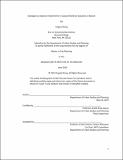| dc.contributor.advisor | Janelle Knox-Hayes. | en_US |
| dc.contributor.author | Wong, Angela,M.C.P.Massachusetts Institute of Technology. | en_US |
| dc.contributor.other | Massachusetts Institute of Technology. Department of Urban Studies and Planning. | en_US |
| dc.coverage.spatial | n-us-ma | en_US |
| dc.date.accessioned | 2020-02-28T20:50:50Z | |
| dc.date.available | 2020-02-28T20:50:50Z | |
| dc.date.copyright | 2019 | en_US |
| dc.date.issued | 2019 | en_US |
| dc.identifier.uri | https://hdl.handle.net/1721.1/123914 | |
| dc.description | This electronic version was submitted by the student author. The certified thesis is available in the Institute Archives and Special Collections. | en_US |
| dc.description | Thesis: M.C.P., Massachusetts Institute of Technology, Department of Urban Studies and Planning, 2019 | en_US |
| dc.description | Cataloged from student-submitted PDF version of thesis. | en_US |
| dc.description | Includes bibliographical references (pages 47-50). | en_US |
| dc.description.abstract | Coastal flooding due to a combination of sea level rise, high tides, and coastal storm events is a significant risk to Boston's population, built environment, and economy. The City of Boston is proactively planning for built district-scale resilience solutions along the shoreline to protect vulnerable neighborhoods. The upfront implementation costs are over a billion dollars and annual maintenance costs add to several tens of millions. Recent studies have conducted a review of the menu of funding and financing options to pay for municipal investments in climate resilience. However, cities face barriers to implementing these new options given existing municipal processes and other near-term policy priorities. In order to advance investments in district-scale resilience solutions in Boston, this study investigates: What is the City of Boston's municipal process, key questions that need to be answered, and stakeholders that need to be involved in order to determine viability and to implement new mechanisms to pay for investments in coastal resilience? What are the key barriers and potential solutions for the City to pursue funding and finance for coastal resilience? This is a client-based masters thesis for the Boston Planning and Development Agency. | en_US |
| dc.description.statementofresponsibility | by Angela Wong. | en_US |
| dc.format.extent | 50 pages | en_US |
| dc.language.iso | eng | en_US |
| dc.publisher | Massachusetts Institute of Technology | en_US |
| dc.rights | MIT theses are protected by copyright. They may be viewed, downloaded, or printed from this source but further reproduction or distribution in any format is prohibited without written permission. | en_US |
| dc.rights.uri | http://dspace.mit.edu/handle/1721.1/7582 | en_US |
| dc.subject | Urban Studies and Planning. | en_US |
| dc.title | Strategies to advance investments in coastal resilience solutions in Boston | en_US |
| dc.type | Thesis | en_US |
| dc.description.degree | M.C.P. | en_US |
| dc.contributor.department | Massachusetts Institute of Technology. Department of Urban Studies and Planning | en_US |
| dc.identifier.oclc | 1139722943 | en_US |
| dc.description.collection | M.C.P. Massachusetts Institute of Technology, Department of Urban Studies and Planning | en_US |
| dspace.imported | 2020-02-28T20:50:49Z | en_US |
| mit.thesis.degree | Master | en_US |
| mit.thesis.department | UrbStud | en_US |
